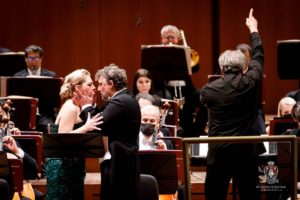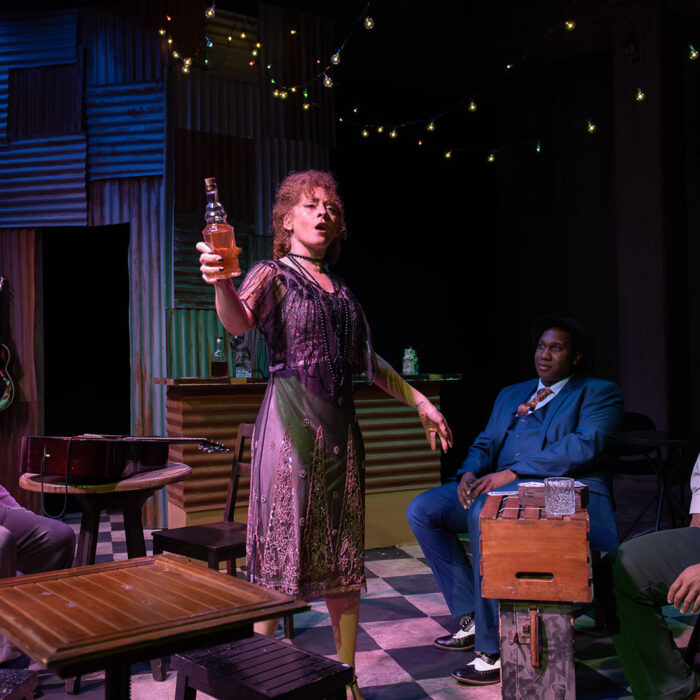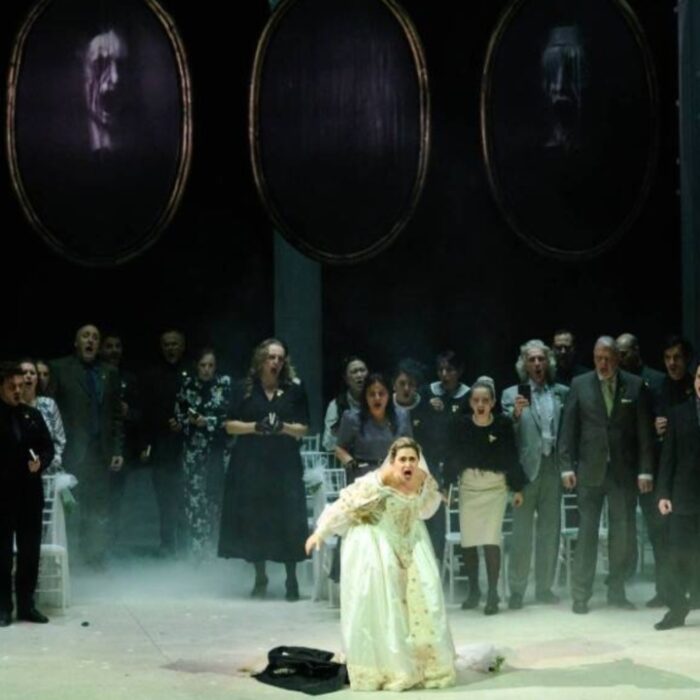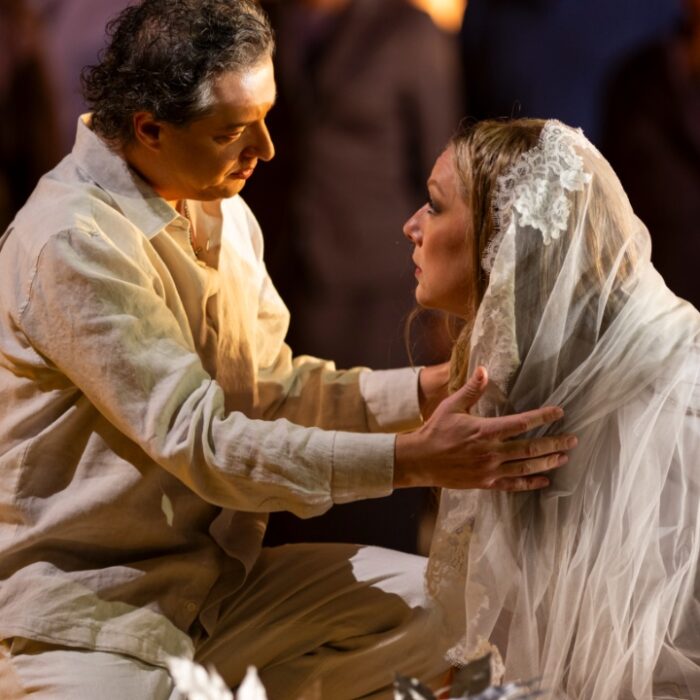
Accademia Nazionale di Santa Cecilia 2021-22 Review: Turandot
Sondra Radvanovsky & Ermonela Jaho Shine in Concert Performance
By Mauricio Villa(Photo: Musacchio, Ianniello & Pasqualini)
Warner Classics produced a new recording of Puccini’s “Turandot” with a dream cast consisting of some of today’s best singers, all under the baton of Antonio Pappano.
After one week of recording sessions, a concert version was offered on March 12 at the Sala Santa Cecilia, in the Auditorium Parco della Musica in Rome. The expectations were high as this performance starred both Sondra Radvanovsky and Jonas Kaufmann in the primary roles of Turandot and Calaf.
As there is no mention in the program of a stage director involved in the concert, it must be assumed that all the movements of the singers belong to their own artistry.
A Revelation
Radvanovsky’s first entrance, walking down the back stairs to refuse the pardon of the Prince of Persia, was breath-taking for the violence, the strength, and the anger that the soprano managed to imprint in her movements. Turandot’s big moment is her entrance aria in the second act, “In questa reggia.” It is a difficult piece. The tessitura demands both a strong low and high register, dramatic voluminous sections and legato mezza voce all at the same time. Radvanovsky’s voice met all the demands perfectly. Her dark, dry tone with mesmerizing volume and projection shined throughout the aria, navigating constantly between high A and B natural and keeping the fluidity of the line with secure clean attacks of the devilish intervals that Puccini wrote. Radvanovsky’s voice was menacing, dangerous and strong without sounding strident in complicated high lines like “Quel grido e quella morte!” Her voice is so resonant and powerful that she does not need to push the sound to make it dramatic and audible over the forte orchestr. Her voice is always ringing no matter how many instruments or singers are playing at the same time. The two high Cs that the soprano must deliver while the whole choir and orchestra play during “Mi vuol nelle tue braccia a forza, rilutante, fremente?” were thunderous, bright, and perfectly audible. Her voice really sounds as if it is being artificially amplified, however it is not.
The soprano can control her voluminous instrument and makes a wise use of her bel canto technique, previously exhibited in Naples were she sang the three long final scenes of Donizetti’s “Three Queens.” This gives her the ability to sing mezza voce and legato lines like “Principessa Lou Ling…” and sound mysterious and even melancholic. Her singing is a mixture of strength and delicacy. She was powerful and strong during her long final aria in Act Three, contrasting with her vulnerable and fragile side portrayed in “Che è mai di me?” which was sung with exquisite mezza voce.
Radvanovsky offered such a powerful and meaningful characterization both vocally and dramaturgically of the Pice princess” Turandot that it is hard to believe it was her role debut. She truly is one of the greatest sopranos of this generation and her performance of Turandot may well become legendary.
Lacking Strength
Neither the role of Calaf, Prince of Tartary, nor singing in a symphonic auditorium with the orchestra placed behind the singers, suited German tenor and opera superstar Jonas Kaufmann. His tone and timbre is beautifully velvety and dark, his phrasing is elegant and he makes a mesmerizing use of mezza voce, yet his voice sounded guttural, small and lacked squillo. The problem with the role of Calaf is that the orchestra plays forte primarily when he goes into the higher register. Unfortunately, the tenor could simply not be heard adequately throughout most of his performance. This was most evident on a big climactic B flat, as Calaf cries out “Turandot!” before the Prince of Persia is beheaded, which was distant distant and barely audible. The same happened during “Non piangere Liù” where Kaufmann demonstrated his legato singing, mezza voce, and clean Italian fraseo during the first verse. He emitted a bright B flat in “Che non sorride piu,” but as the voices of Liu, Timur, Ping, Pang, Pong and the choir joins in, and the orchestra rises in intensity, the tenor struggled to cut through the aural mass.
Additionally, the tenor’s way of singing the passagio and high notes blurred his diction and all the vowels sounded round and with an ‘o” quality. This was quite noticeable in Calaf’s famous aria “Nessun Dorma,” while in lines like “sulla tua boca” and “Di legua, o note,” where the tenor is expected to phrase on high A naturals, Kaufmann managed to emit secure A’s but excessively darkened and rounded the sound to the point of making the lines incomprehensible. It was not ideal for Kaufmann’s voice to have Radvanovsky as his partner, who overpowered him every time they sang together, particularly during the Act three duet.
Despite this there were still moments when Kaufmann shone. The second act suited the tenor’s vocalitá better, with Kaufmann emitting secure A naturals and a B flat throughout the “Riddles” scene. “Nessun Dorma” was the best aria for the German tenor. Pappano measured the orchestra’s sound, giving the tenor’s voice prominence, and Kaufmann consequently sounded heroic and lyrical, crowning the aria with a bright secure B natural (though it lacked squillo).
Simplicity & Beauty
Albanian soprano Ermonela Jaho sang the role of the sorrowful and infatuated Liù. She is famous for her great dramatic portrayals of Butterfly and Violetta and Jaho once again displayed her talent for astounding vocal characterization and the deep honesty and sensibility that she imprints in every role. She was humble, sweet, fragile, and determined up to her climactic self-sacrifice. Liù is a short role that is relegated to a few spare lines, but it has two arias and is essential to the plot of the opera. It requires mezza voce and pianissimi singing up to B flat. Jaho colored her dark lyrical voice to sound young and innocent, emitting a crystalline sound in her line “perche un di nella regia,” crowned by her first soaring B flat pianissimi of the night. She sang her first act aria “Signore ascolta!” with an extreme simplicity, completely effortlessly, freely navigating the long legato lines and sustaining a floating long final B flat. J
Jaho’s voice is not big, but it projects amazingly and carries perfectly over the heavy orchestration. Her lines were present and strong in “Non piangere Liù,” with resonant ringing forte B flats surpassing the voices of all the other soloists and forte orchestra. Her second act aria, “Tu che del gel sei cinta,” was a chance for Jaho to express all the dramatism and portrayals of pain for which she is famous. Her interpretation of the aria was extremely moving and reflected the pathos of the character’s sacrifice, as she must kill herself to keep Calaf’s secret and protect him from the “ice princess” Turandot, demonstrating her overwhelming love for the prince. She was strongly rewarded by the audience at the end of the concert with a loud ovation.
Prolific Italian veteran bass Michele Pertusi sang the short role of Timur. His voice has grown and darkened with age so he could vocally portray the dignity of this old, blind and long-suffering father. His interpretation of the short scene following Liu’s death was menacing and strong in “Ah! Delitto orrendo,” delivering a strong thunderous high F and a secure maintained E flat in “Si vendicherá!” while also sorrowful in “Liu! Bonta.” The characterizations of Ping, Pang and Pong, played by Mattia Olivieri, Gregory Bonfatti and Siyabonga Maqungo respectively, were amusing, lively and comical. Their voices blended perfectly together, although Maqungo’s bright voice was sometimes more present.
Antonio Pappano presented a critical edition of the score with new music in the final scene written by Franco Alfano in 1925, rather that the ending which is traditionally performed. He gave a passionate reading of the score, extracting all the exoticism and oriental rhythms that Puccini wrote into his score. He opted for slow tempi in general and the opening scene was maybe too pesante, but Pappano knows how to keep tension in the orchestra. He plays along with the singers at every moment, as if the orchestra is breathing with them, creating instances of delicacy and beauty, especially in Liu’s arias. He is dynamic, playing from soft piannisimi to great crescendos and into fortissimo. He underlined all the timbrical richness of the score. The sound of the Orchestra dell’Accademia Nazionale di Santa Cecilia was overwhelming and exciting and the long interventions of the Coro e Voci Bianche dell’Accademia Nazionale di Santa Cecilia were brilliant. They were strategically placed on the seats in the back of the auditorium where they were able to maintain social distance and were accordingly able to sing without masks, and the sound was full, rich, and powerful.
A great concert of Puccini’s “Turandot” the incredible performances of sopranos Sondra Radvanovsky and Ermonela Jaho shown. Conductor Antonio Pappano was at his best and led the orchestra wonderfully. This “Turandot” promises to be one of the best recordings in recent years.


